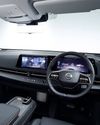The newest Ford in town – the Freestyle – is what the company calls a compact utility vehicle or CUV. Based on the Figo platform, Ford India claims the Freestyle is an almost entirely new product. And it is new in many aspects – it’s a new body style for Ford, it gets a new engine and a new transmission too. The company invited us to drive the Freestyle from Jaipur to the Sambhar Salt Lake, India’s largest inland salt lake in Rajasthan recently. We delve under the hood of the new Ford Freestyle.

INTRODUCTION
At the first glance, the Freestyle is unmistakably a sturdy, tough, crossover hatchback version of Ford’s small car, Figo. Having said that, the Freestyle – as Ford claims – is indeed an entirely new product. Sure it looks different, but Ford has also got the Freestyle a new heart – a new 1.2 l petrol engine and a new 5-speed manual transmission.
With its position as a CUV, Ford India is clearly trying to create a niche between the crossover hatchbacks and the compact SUVs. It gets the compactness of hatchbacks, and is also given the body style and performance characteristics of a sports utility vehicle. Ford has made the product all the more compelling for interested customers with a fairly aggressive pricing strategy. Starting at a price of ₹5.09 lakh, it actually undercuts the Figo.
We’ll get to the details of how the vehicle drives a little later in this report. For now, let’s consider the technical highlights of the Freestyle.
HEART OF THE MATTER
Ford has two engine options on the Freestyle – a 1.5 l TDCi diesel unit that produces approximately 100 hp of peak power and 215 Nm of torque, and a new 1.2 l Ti-VCT petrol engine that generates around 95 hp of peak power and 120 Nm of maximum torque around 4,250 rpm.
The new 1.2 l petrol engine has been derived from the 1.5 l petrol unit Ford introduced earlier in the EcoSport. The compact three-cylinder engine is made of a lightweight aluminium engine block and cylinder head, and features an integrated exhaust manifold that is aimed to lower NVH levels. The use of aluminium is claimed to have considerably reduced the weight of the engine. The exhaust manifold, on the other hand, is integrated into the cylinder head, which heats up the catalyst faster, thus leading to decreased emissions.
This story is from the {{IssueName}} edition of {{MagazineName}}.
Start your 7-day Magzter GOLD free trial to access thousands of curated premium stories, and 9,000+ magazines and newspapers.
Already a subscriber ? Sign In
This story is from the {{IssueName}} edition of {{MagazineName}}.
Start your 7-day Magzter GOLD free trial to access thousands of curated premium stories, and 9,000+ magazines and newspapers.
Already a subscriber? Sign In

Sound Generation For Enhanced Road Safety
With an ever-increasing number of fully electric and hybrid vehicles entering the market, we are witnessing a change in the acoustic experience in and around the car. The silent nature of the electric powertrain means that other road users miss the familiar acoustic cues that warn them of an approaching vehicle. To remedy this situation, Harman is working on various noise management solutions.

OBJECTIVE ASSESSMENT OF THE SAFETY CONTRIBUTION OF TODAY'S AUTOMOTIVE HEADLAMPS
Good lighting makes a major contribution to road safety. In 2011, the International Commission on Illumination (CIE) presented an evaluation system for headlamps that can objectively assess the quality of illumination and glare limitation. New light sources like LEDs and lighting functions (glare-free high beam, partial high beam) have been available for several years, so that an extension of the proven CIE method is necessary, which takes into account, among other things, changed switch-on and service lives of new lighting functions and represents a generally understandable evaluation system. An evaluation system presented in the following by the Technische Uni versität Darmstadt, which was developed by an encompassing expert commission, is intended to provide representative data and enable an objective evaluation of headlamp performance.

RAPIDO RE-INNOVATES TO CATER TO POST COVID-19 LAST MILE CONNECTIVITY
The rapid pace of urbanisation in the country has witnessed cities expanding and subsuming surrounding villages and smaller towns, evolving into Tier II and III cities.

FUNCTIONAL SAFETY STANDARDS TOP PRIORITY FOR FUTURE AUTOMOTIVE DEPLOYMENT
Increasing levels of electronic content in vehicles result in a large amount of software that is required to run the scenes behind the mechanical aspects of a vehicle. Electronic systems in automobiles are part of every section, from the powertrain to comfort and convenience systems as well as all types of safety equipment. This makes electronics and the software running these systems a critical part of the equation for future mobility solutions. In addition, putting standards in place to measure methods of developing, testing and functioning of such electronic systems also becomes highly relevant.

“BYD'S EV STRATEGY TO ENCOMPASS MOST FORMS OF TRANSPORTATION NEEDS IN INDIA”
The country’s electric vehicle (EV) ecosystem is grappling with a plethora of challenges even as it is striving to wriggle itself out of the ‘nascent stage’ tag. In an exclusive chat with Auto Tech Review, Zhang Jie Ketsu, Executive Director, BYD India shares his perspective on the current EV scenario and how the company intends to progress faster in the Indian automotive industry

SAFETY IN ELECTRIC AND AUTONOMOUS CARS – SIMULATION OF COMPLEX CRASH SCENARIOS
Electric and autonomous vehicles allow for novel seating arrangements and packaging strategies, presenting new safety challenges. Physical crash testing must be supplemented with virtual simulation to ensure vehicle safety on shorter development cycles. With its Simcenter Madymo MBS software, Siemens provides improved runtimes and the Active Human model, enabling accurate and rapid occupant safety analysis in complex crash scenarios.

KIA SONET – A MIGHTY OFFERING IN THE COMPACT SUV SEGMENT
It wouldn't be wrong to say that Kia Motors India has taken the Indian market by storm in less than 12 months of its presence in the market.

NISSAN'S NEW DIRECTION: ARIYA ALL-ELECTRIC
Marking a key milestone in Nissan’s transformation strategy, Ariya ticks a lot of boxes highlighting the strengths of the global automotive giant.

BETTER SAFETY WITH EMERGENCY BRAKE ASSIST FOR MOTORCYCLES
Rear-end collisions with a slower vehicle suddenly cutting into the lane and intersection accidents with cross-traffic are among the most frequent motorcycle accident types. Continental is now developing an emergency brake assist, which detects an imminent collision with a vehicle ahead or with an obstacle, warns the rider and supports him during braking

ADAS WILL SERVE AS CATALYST FOR IMPROVED VEHICLE SAFETY
The automotive industry across the globe is increasingly focussing on safety.